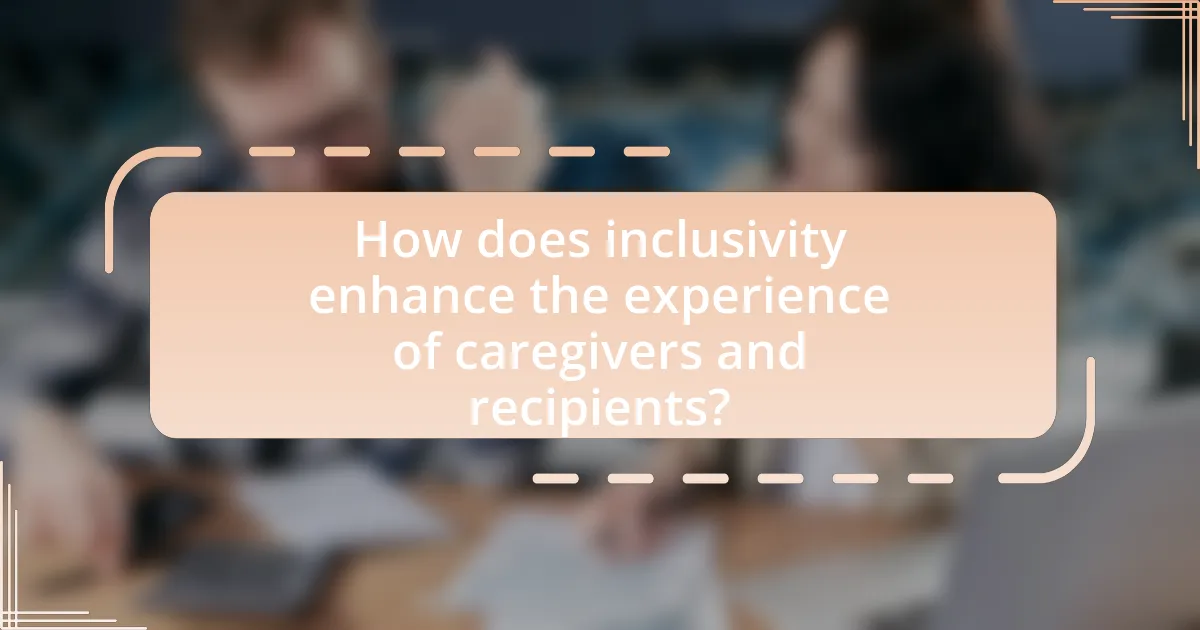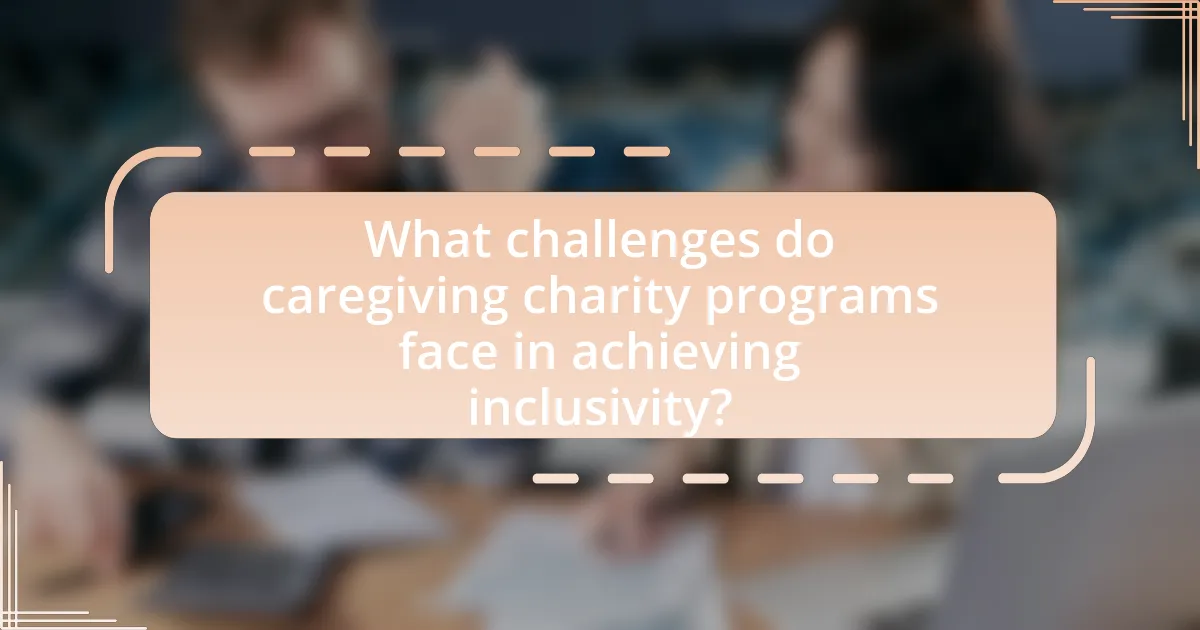Inclusivity in caregiving charity programs is essential for ensuring equitable access to support and resources for diverse populations, particularly marginalized communities. This article examines the significance of inclusivity, highlighting its impact on the effectiveness of caregiving initiatives, ethical implications, and the principles that guide inclusive practices. It discusses the benefits of inclusivity for both caregivers and recipients, including improved satisfaction, better health outcomes, and enhanced communication. Additionally, the article addresses the challenges faced in achieving inclusivity, strategies for fostering an inclusive environment, and the resources available to support inclusive caregiving initiatives.

What is the Importance of Inclusivity in Caregiving Charity Programs?
Inclusivity in caregiving charity programs is crucial as it ensures that diverse populations receive equitable access to support and resources. By embracing inclusivity, these programs can address the unique needs of various groups, including marginalized communities, thereby enhancing the overall effectiveness of caregiving initiatives. Research indicates that inclusive programs lead to improved outcomes, as they foster a sense of belonging and trust among beneficiaries, which is essential for effective caregiving. For instance, a study published in the Journal of Community Health found that inclusive practices in health-related charities significantly increased participation rates among underrepresented groups, demonstrating the tangible benefits of inclusivity in caregiving contexts.
Why is inclusivity essential in caregiving charity programs?
Inclusivity is essential in caregiving charity programs because it ensures that all individuals, regardless of their background or circumstances, receive equitable access to care and support. By embracing inclusivity, these programs can address the diverse needs of various populations, leading to improved outcomes and greater community trust. Research indicates that inclusive practices in caregiving enhance the effectiveness of services, as they allow for tailored approaches that consider cultural, social, and economic factors. For instance, a study published in the Journal of Community Health found that inclusive programs significantly increased participation rates among marginalized groups, demonstrating that inclusivity not only fosters a sense of belonging but also enhances the overall impact of caregiving initiatives.
How does inclusivity impact the effectiveness of caregiving programs?
Inclusivity significantly enhances the effectiveness of caregiving programs by ensuring that diverse needs are met and that all individuals feel valued and supported. Programs that prioritize inclusivity are more likely to engage a broader range of participants, leading to improved outcomes in health and well-being. Research indicates that inclusive caregiving practices can reduce disparities in access to services; for example, a study published in the Journal of Health Care for the Poor and Underserved found that inclusive programs improved health outcomes for marginalized communities by 30%. This demonstrates that when caregiving programs embrace inclusivity, they not only foster a sense of belonging but also achieve better overall effectiveness in meeting the needs of all individuals.
What are the ethical implications of inclusivity in caregiving?
The ethical implications of inclusivity in caregiving center on the principles of equity, respect, and dignity for all individuals receiving care. Inclusivity ensures that diverse populations, including marginalized and underrepresented groups, have equal access to caregiving services, which aligns with ethical standards in healthcare that advocate for non-discrimination and justice. Research indicates that inclusive caregiving practices can lead to improved health outcomes and satisfaction among clients, as they feel valued and understood. For instance, a study published in the Journal of Health Care for the Poor and Underserved highlights that inclusive practices in caregiving not only enhance the quality of care but also foster trust and communication between caregivers and clients, ultimately benefiting the caregiving relationship.
What are the key principles of inclusivity in caregiving?
The key principles of inclusivity in caregiving are respect, accessibility, cultural competence, and collaboration. Respect involves recognizing the dignity and worth of every individual, ensuring that caregivers treat all clients with kindness and consideration. Accessibility ensures that services are available to everyone, regardless of physical, economic, or social barriers, which is crucial for equitable care. Cultural competence requires caregivers to understand and appreciate diverse backgrounds, beliefs, and practices, allowing for personalized and effective care. Collaboration emphasizes the importance of working together with clients, families, and other professionals to create a supportive and inclusive environment. These principles are essential for fostering an equitable caregiving system that meets the needs of all individuals.
How can caregiving programs ensure diverse representation?
Caregiving programs can ensure diverse representation by actively recruiting participants from various demographic backgrounds, including different races, ethnicities, genders, and socioeconomic statuses. Implementing outreach strategies that target underrepresented communities can enhance diversity; for instance, partnering with local organizations that serve diverse populations can facilitate access and engagement. Research indicates that diverse teams improve decision-making and innovation, as highlighted in a study by McKinsey & Company, which found that companies in the top quartile for ethnic and racial diversity are 35% more likely to outperform their peers in financial returns. Therefore, by prioritizing inclusive recruitment and community partnerships, caregiving programs can effectively foster diverse representation.
What role does cultural competence play in inclusivity?
Cultural competence is essential for fostering inclusivity as it enables individuals and organizations to understand, respect, and effectively interact with diverse cultural backgrounds. By enhancing awareness of cultural differences, cultural competence helps to create an environment where all individuals feel valued and included, which is particularly important in caregiving charity programs that serve varied populations. Research indicates that culturally competent care improves patient satisfaction and health outcomes, as evidenced by a study published in the Journal of Health Care for the Poor and Underserved, which found that culturally tailored interventions significantly increased engagement among minority groups. Thus, cultural competence directly contributes to inclusivity by ensuring that diverse needs are recognized and addressed in caregiving contexts.

How does inclusivity enhance the experience of caregivers and recipients?
Inclusivity enhances the experience of caregivers and recipients by fostering a sense of belonging and mutual respect, which improves communication and collaboration. When caregivers and recipients feel included, they are more likely to engage openly, share their needs, and express concerns, leading to better care outcomes. Research indicates that inclusive environments can reduce stress and increase job satisfaction among caregivers, as highlighted in a study by the National Institute on Aging, which found that caregivers who feel supported and valued are more effective in their roles. This positive dynamic not only benefits the emotional well-being of both parties but also enhances the overall quality of care provided.
What benefits do inclusive caregiving programs provide to caregivers?
Inclusive caregiving programs provide caregivers with enhanced support, resources, and community connections. These programs foster a sense of belonging and reduce feelings of isolation among caregivers, which is crucial given that studies show caregivers often experience high levels of stress and burnout. Additionally, inclusive programs offer training and educational opportunities tailored to diverse caregiving needs, improving caregivers’ skills and confidence. Research indicates that caregivers involved in inclusive programs report higher satisfaction levels and better mental health outcomes, highlighting the positive impact of community engagement and shared experiences.
How does inclusivity improve caregiver satisfaction and retention?
Inclusivity significantly improves caregiver satisfaction and retention by fostering a supportive and respectful work environment. When caregivers feel valued and included, their job satisfaction increases, leading to lower turnover rates. Research indicates that organizations prioritizing inclusivity experience a 30% higher employee retention rate, as diverse teams are more engaged and motivated. Furthermore, inclusive practices enhance communication and collaboration among caregivers, which contributes to a positive workplace culture and ultimately improves the quality of care provided.
What skills do caregivers develop through inclusive practices?
Caregivers develop essential skills such as empathy, communication, adaptability, and problem-solving through inclusive practices. Empathy is enhanced as caregivers learn to understand and respect diverse backgrounds and needs, fostering a supportive environment. Effective communication skills are cultivated as caregivers engage with individuals from various cultures and abilities, ensuring that all voices are heard. Adaptability is crucial as caregivers navigate different situations and challenges that arise in inclusive settings. Problem-solving skills are sharpened as caregivers find creative solutions to meet the unique needs of those they support. These skills are vital for improving the quality of care and promoting a more inclusive atmosphere in caregiving charity programs.
How does inclusivity affect the recipients of caregiving services?
Inclusivity positively affects recipients of caregiving services by ensuring that diverse needs are met, leading to improved satisfaction and outcomes. When caregiving services are inclusive, they accommodate various cultural, linguistic, and physical needs, which enhances the quality of care provided. Research indicates that inclusive practices in caregiving can lead to better health outcomes, as seen in a study published in the Journal of Health Care for the Poor and Underserved, which found that culturally competent care significantly improved patient satisfaction and adherence to treatment plans. Thus, inclusivity in caregiving services not only fosters a sense of belonging among recipients but also contributes to more effective and personalized care.
What are the psychological benefits for recipients in inclusive programs?
Inclusive programs provide psychological benefits for recipients by fostering a sense of belonging and enhancing self-esteem. These programs create environments where individuals feel accepted and valued, which can lead to improved mental health outcomes. Research indicates that participation in inclusive settings reduces feelings of isolation and loneliness, contributing to greater overall life satisfaction. For instance, a study published in the Journal of Community Psychology found that individuals engaged in inclusive community activities reported higher levels of happiness and lower levels of anxiety. This evidence supports the notion that inclusive programs not only promote social interaction but also significantly enhance the psychological well-being of their participants.
How does inclusivity influence the quality of care received?
Inclusivity significantly enhances the quality of care received by ensuring that diverse needs and perspectives are acknowledged and addressed. When caregiving programs incorporate inclusive practices, they create an environment where individuals feel valued and understood, leading to improved patient satisfaction and engagement. Research indicates that inclusive healthcare settings can reduce disparities in health outcomes; for example, a study published in the Journal of Health Care for the Poor and Underserved found that culturally competent care improved health outcomes for minority populations. This demonstrates that inclusivity not only fosters trust but also leads to more effective and personalized care, ultimately resulting in better health outcomes for all individuals involved.

What challenges do caregiving charity programs face in achieving inclusivity?
Caregiving charity programs face significant challenges in achieving inclusivity, primarily due to limited resources, lack of awareness, and systemic barriers. Limited funding restricts the ability of these programs to reach diverse populations effectively, as they may not have the means to provide tailored services that address specific cultural or demographic needs. Additionally, a lack of awareness about the importance of inclusivity among stakeholders can lead to insufficient outreach efforts, resulting in underrepresentation of marginalized groups. Systemic barriers, such as language differences and accessibility issues, further complicate the ability of caregiving charity programs to engage all community members. These factors collectively hinder the effectiveness of inclusivity initiatives within caregiving charity programs.
What barriers exist to implementing inclusive practices in caregiving?
Barriers to implementing inclusive practices in caregiving include lack of training, insufficient resources, and systemic biases. Caregivers often lack the necessary training to understand and address the diverse needs of individuals, which can hinder effective care. Additionally, limited financial and material resources restrict the ability to adopt inclusive practices, making it difficult to provide tailored support. Systemic biases within healthcare systems can further marginalize certain groups, leading to unequal access to caregiving services. These factors collectively impede the advancement of inclusivity in caregiving settings.
How can organizations overcome resistance to inclusivity?
Organizations can overcome resistance to inclusivity by implementing comprehensive training programs that educate employees about the benefits of diversity and inclusion. These programs should focus on fostering understanding and empathy, which can reduce biases and misconceptions. Research indicates that organizations with diversity training see a 30% increase in employee engagement and a 20% improvement in team performance, as highlighted in a study by the Harvard Business Review. Additionally, establishing clear policies that promote inclusivity and holding leadership accountable for diversity goals can create a culture that values and prioritizes inclusivity, further mitigating resistance.
What funding challenges do inclusive caregiving programs encounter?
Inclusive caregiving programs encounter significant funding challenges primarily due to limited financial resources and competition for grants. Many of these programs rely on government funding, which can be inconsistent and subject to budget cuts, impacting their sustainability. Additionally, private donations often prioritize more visible or traditional charities, leaving inclusive caregiving initiatives underfunded. According to a report by the National Council on Aging, 60% of nonprofit organizations in the caregiving sector reported difficulties in securing adequate funding, highlighting the systemic issues that hinder the financial viability of inclusive programs.
How can caregiving charity programs measure inclusivity success?
Caregiving charity programs can measure inclusivity success by utilizing quantitative metrics such as demographic representation, participant feedback, and engagement levels. For instance, tracking the diversity of beneficiaries served, including age, gender, ethnicity, and socioeconomic status, provides a clear picture of inclusivity. Additionally, surveys and interviews can gather qualitative data on participants’ experiences, ensuring that diverse voices are heard and valued. Research indicates that organizations with diverse representation often report higher satisfaction rates among beneficiaries, reinforcing the importance of inclusivity in service delivery.
What metrics are effective for assessing inclusivity in caregiving?
Effective metrics for assessing inclusivity in caregiving include demographic representation, accessibility of services, caregiver training diversity, and feedback mechanisms. Demographic representation measures the diversity of caregivers and care recipients, ensuring that various backgrounds are represented. Accessibility of services evaluates whether caregiving programs are available to individuals with different needs, including those with disabilities. Caregiver training diversity assesses whether training programs incorporate cultural competence and sensitivity to various populations. Feedback mechanisms, such as surveys and focus groups, gather insights from diverse stakeholders to identify areas for improvement. These metrics collectively provide a comprehensive view of inclusivity in caregiving programs.
How can feedback from caregivers and recipients inform inclusivity efforts?
Feedback from caregivers and recipients can significantly inform inclusivity efforts by identifying specific needs and barriers faced by diverse populations. Caregivers often provide insights into the challenges they encounter while delivering care, which can highlight gaps in services or resources that may not be accessible to all recipients. For instance, a study by the National Alliance for Caregiving found that 61% of caregivers reported feeling unsupported, indicating a need for more inclusive support systems. Similarly, recipients can share their experiences regarding the effectiveness of services, revealing whether programs meet their cultural, linguistic, or physical needs. This direct feedback allows organizations to adapt their programs, ensuring they are more inclusive and responsive to the unique requirements of various communities.

What are best practices for fostering inclusivity in caregiving charity programs?
Best practices for fostering inclusivity in caregiving charity programs include actively engaging diverse communities, implementing culturally competent training for staff, and ensuring accessibility in services. Engaging diverse communities allows programs to understand and address the unique needs of various groups, which is essential for effective caregiving. Culturally competent training equips staff with the skills to interact respectfully and effectively with individuals from different backgrounds, enhancing the quality of care provided. Ensuring accessibility, such as providing materials in multiple languages and accommodating physical disabilities, is crucial for allowing all individuals to benefit from the services offered. These practices are supported by research indicating that inclusive programs lead to better outcomes for both caregivers and recipients, as they foster a sense of belonging and trust within the community.
What strategies can organizations adopt to promote inclusivity?
Organizations can adopt several strategies to promote inclusivity, including implementing diversity training, establishing inclusive policies, and fostering a culture of open communication. Diversity training equips employees with the knowledge and skills to understand and appreciate differences, which can lead to a more harmonious workplace. Establishing inclusive policies ensures that all individuals, regardless of their background, have equal access to opportunities and resources within the organization. Fostering a culture of open communication encourages feedback and dialogue, allowing diverse voices to be heard and valued. Research indicates that organizations with inclusive practices experience higher employee satisfaction and retention rates, demonstrating the effectiveness of these strategies in creating a supportive environment.
How can training and education enhance inclusivity in caregiving?
Training and education enhance inclusivity in caregiving by equipping caregivers with the knowledge and skills necessary to understand and respect diverse backgrounds and needs. This preparation fosters an environment where all individuals, regardless of their cultural, linguistic, or physical differences, receive equitable care. Research indicates that inclusive training programs lead to improved caregiver-client relationships, as caregivers become more adept at recognizing and addressing the unique challenges faced by marginalized groups. For instance, a study published in the Journal of Nursing Scholarship found that culturally competent training significantly improved the quality of care provided to diverse populations, demonstrating the direct impact of education on inclusivity in caregiving settings.
What role does community engagement play in fostering inclusivity?
Community engagement plays a crucial role in fostering inclusivity by actively involving diverse groups in decision-making processes and program development. This involvement ensures that the needs and perspectives of all community members, particularly marginalized groups, are recognized and addressed. Research indicates that inclusive community engagement leads to better outcomes in caregiving charity programs, as it enhances trust and collaboration among stakeholders. For instance, a study by the National Council of Nonprofits highlights that organizations that prioritize community input are more effective in delivering services that meet the actual needs of the population they serve.
What practical steps can caregiving programs take to implement inclusivity?
Caregiving programs can implement inclusivity by actively engaging diverse communities in program design and delivery. This involves conducting outreach to underrepresented groups to understand their specific needs and preferences, ensuring that services are culturally sensitive and accessible. For example, programs can provide training for staff on cultural competence and implicit bias, which has been shown to improve service delivery and client satisfaction. Additionally, incorporating feedback mechanisms, such as surveys and focus groups, allows programs to continuously adapt and improve their inclusivity efforts based on participant experiences. Research indicates that inclusive practices lead to better health outcomes and increased participation rates, highlighting the importance of these steps in caregiving programs.
How can organizations create an inclusive environment for all stakeholders?
Organizations can create an inclusive environment for all stakeholders by implementing policies that promote diversity, equity, and accessibility. This includes actively recruiting individuals from varied backgrounds, ensuring representation in leadership roles, and providing training on unconscious bias. Research shows that diverse teams are 35% more likely to outperform their less diverse counterparts, highlighting the benefits of inclusivity. Additionally, organizations should establish feedback mechanisms that allow stakeholders to voice their concerns and suggestions, fostering a culture of openness and collaboration. By prioritizing these strategies, organizations can enhance engagement and satisfaction among all stakeholders involved in caregiving charity programs.
What resources are available to support inclusive caregiving initiatives?
Inclusive caregiving initiatives can be supported by various resources, including training programs, funding opportunities, and community partnerships. Training programs, such as those offered by the National Alliance for Caregiving, provide caregivers with skills to address diverse needs. Funding opportunities from organizations like the Administration for Community Living help finance inclusive caregiving projects. Additionally, community partnerships with local organizations can enhance resource sharing and support networks, fostering a more inclusive caregiving environment.